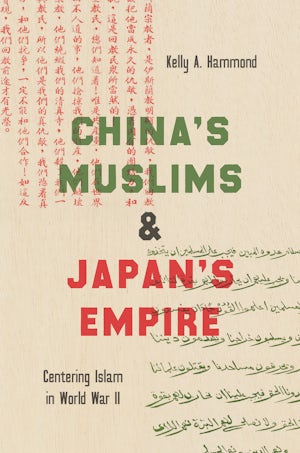China's Muslims and Japan's Empire
Centering Islam in World War II
By Kelly A. Hammond
314 pp., 6.125 x 9.25, 15 halftones, 3 maps, 2 tables, notes, bibl., index
-
Paperback ISBN: 978-1-4696-5965-7
Published: November 2020 -
Hardcover ISBN: 978-1-4696-5964-0
Published: November 2020 -
E-book EPUB ISBN: 978-1-4696-5966-4
Published: September 2020 -
E-book PDF ISBN: 979-8-8908-6031-6
Published: September 2020
Islamic Civilization and Muslim Networks
Buy this Book
- Paperback $32.50
- Hardcover $99.00
- E-Book $22.99
This history can be told only by reinstating agency to Muslims in China who became active participants in the brokering and political jockeying between the Chinese Nationalists and the Japanese Empire. Hammond argues that the competition for their loyalty was central to the creation of the ethnoreligious identity of Muslims living on the Chinese mainland. Their wartime experience ultimately helped shape the formation of Sino-Muslims’ religious identities within global Islamic networks, as well as their incorporation into the Chinese state, where the conditions of that incorporation remain unstable and contested to this day.
About the Author
Kelly A. Hammond is assistant professor of history at the University of Arkansas.
For more information about Kelly A. Hammond, visit
the
Author
Page.
Reviews
“China’s Muslims and Japan’s Empire has a little bit for everyone. It has contemporary implications for the ways that we think about the place of Muslim minorities who live in the People’s Republic of China. At the same time, there are some good escapist stories that follow individual Muslims as they navigate their relationships with the Japanese Empire during World War II.”—Los Angeles Review of Books China Channel
"An illuminating overview of Japan’s overtures during WWII to minority Muslim communities in Asia as a nation-building tactic. . . . An excellent and important addition to the WWII history shelf."—Publishers Weekly
"A fascinating read and provides insight into a region and history which are all too often neglected. The book forces us to re-think how the history of the Second World War is taught. Our understanding of the conflict is usually from the perspective of Europe and the war with Germany, but millions fought and died across Asia and many of the wounds from that time are part of the political memory in places like China. This book is a much needed study. The fact that it is also an enjoyable read is a bonus."—Middle East Monitor
"An important contribution to the study of the cultural and intellectual history of the Japanese Empire. . . . A must-read for those eager to develop a critical perspective concerning how war and politics first appropriated minority religious communities and how these communities responded to state power and imperial violence."—H-War
“Hammond deftly weaves a compelling narrative that centres Islam in a period of history in which it is often overlooked and excluded.”—The Muslim World Book Review
“One of the strengths of the book is that it tells the other side of the story, that is, the multitude of debates among Sino-Muslims themselves about what to make of the new power in the region, debates that ranged from skepticism to acceptance to hopes for Japan’s sponsorship in return for political support. As a religious minority within the Han Chinese–centric polity, Sino-Muslims had to strategize their relationship with the Chinese Nationalists and Japanese imperialists, and Hammond offers a nuanced account of such politicized topics as collaboration and resistance.”—Twentieth-Century China


